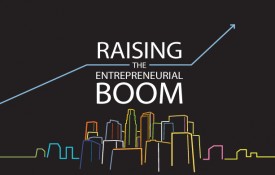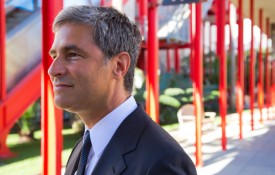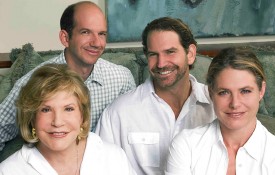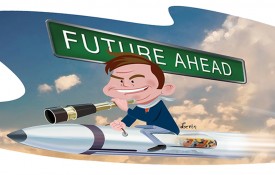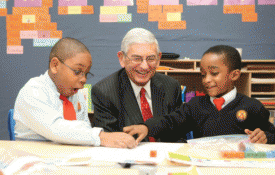 We Americans have a unique history. We are proud of our independence and entrepreneurial, can-do spirit, yet we also have an equally strong desire to serve and be part of a larger community. Alexis de Tocqueville noted that our passion to volunteer and create organizations brought communities together, which balanced our independent nature with our need to belong. As our country grew and prospered, we institutionalized our commitment to others by creating a formal mechanism for giving and engaging. Today we call it philanthropy. Whether our generous spirit is found in our children bringing canned goods to schools for the food drive, donating to a place of worship, or sending remittance back home in another country, we are all philanthropists. According to the most current figures from Giving USA, Americans donated $228 billion in 2012. By and large, it wasn’t the billionaires who gave. The average household donated $1,200. Today, in all of our communities, this commitment to giving back brings together corporate leaders, faith communities, philanthropic institutions, not-for-profits and everyday Americans from every walk of life who seek to improve the human condition.
We Americans have a unique history. We are proud of our independence and entrepreneurial, can-do spirit, yet we also have an equally strong desire to serve and be part of a larger community. Alexis de Tocqueville noted that our passion to volunteer and create organizations brought communities together, which balanced our independent nature with our need to belong. As our country grew and prospered, we institutionalized our commitment to others by creating a formal mechanism for giving and engaging. Today we call it philanthropy. Whether our generous spirit is found in our children bringing canned goods to schools for the food drive, donating to a place of worship, or sending remittance back home in another country, we are all philanthropists. According to the most current figures from Giving USA, Americans donated $228 billion in 2012. By and large, it wasn’t the billionaires who gave. The average household donated $1,200. Today, in all of our communities, this commitment to giving back brings together corporate leaders, faith communities, philanthropic institutions, not-for-profits and everyday Americans from every walk of life who seek to improve the human condition.
We just don’t give money. Americans donate their time and talents as well. According to the U.S. Bureau of Labor Statistics, about 63 million people volunteered their time between September 2012 and September 2013, spending a median of 50 hours on volunteer activities. This does not begin to capture online mobilization and advocacy.
Compassion is not just a lovely ideal. It actually strengthens our democracy. Coming together for the betterment of our communities reinforces the importance of a healthy civil society and fortifies our nation.
Community foundations are the outgrowth of this collective history of giving and belonging. Referred to as “the people’s foundations,” there are some 750 community foundations in every state and in most communities. It is estimated that we give $4.3 billion annually and control $58 billion in assets from donors large and small who continually reaffirm what is some of our nation’s most inspiring characteristics: our generosity and compassion.
Despite this generosity, we are living in difficult times and poverty is on the rise once again. With one in six Americans living below the poverty line and 22 percent of all children growing up poor, we are challenged as a society to turn this trend around. We know the major factors at play. Our new economy, as seen in the demise of cities like Detroit, has shifted away from offering well-paying manufacturing jobs that were the key to building the middle class. Equally problematic are the poor options for many of today’s workers: low skilled, low-paying jobs that are insufficient to keep a family out of poverty. Other factors include the need to improve our schools and find ways to make higher education more affordable and accessible.
Fortunately, there are tireless leaders from all backgrounds and sectors in our communities who are willing to come together to solve our most urgent problems.
Take Linwood Boomer, most famous for creating the iconic American television show, “Malcolm in the Middle.” Mr. Boomer’s passion for helping hungry families is changing the way we address this issue in Los Angeles County. In 2010, while many parts of the nation were beginning to see their economy recover and jobs reappear, unemployment in Los Angeles County remained higher than the national average, at 12 percent. Hunger and food insecurity affected one in six Angelenos. The Los Angeles Regional Food Bank had been on Mr. Boomer’s radar for some time, and he wanted to help address the hunger problem in his community. He and his wife previously had established a fund at the California Community Foundation. Mr. Boomer read about the model program in another part of the country that he thought might work well in Los Angeles. He discussed its potential with CCF and with the Food Bank’s Executive Director, Michael Flood, who had successfully increased his organization’s food volume some 78 percent since the Great Recession hit, thanks to an outpouring of donations. Yet, given the severity of the economic downturn in L.A. County, his agency was still struggling with an increase in demand that couldn’t be met.
The two put together a highly effective outreach program that has, as of September 2014, enrolled an additional 10,000 individuals in the Food Stamp Program, now called SNAP (and CalFresh in California). This effort not only provides greater food security to individuals and families but also enables the Food Bank to serve more people in need.
This model program has become so successful that Mr. Boomer and Mr. Flood are working together to improve California’s overall enrollment of hungry families. California is ranked last among all 50 states in SNAP enrollment for those qualified for the program. We know that getting proper nutrition in households helps stabilize families and helps boost local economies. Mr. Boomer’s program is so successful that CCF is providing additional support and helping him and Mr. Flood broaden donor participation in the program.
Having a community foundation as a partner helped Mr. Boomer to pursue his passion. It is the role of community foundations to know and understand the community they serve and to assist donors to champion their causes and create an impact.
What is unique about a community foundation is that it belongs to the community. Our role is to connect need with resources, and since 1915 we have collaborated with many partners to improve the quality of life for all Angelenos. Today, we manage thousands of funds and legacies left for future generations, representing the generosity and compassion of our community. Those extraordinary individuals who partner with us include the late investor and philanthropist Joan Palevsky, who bequeathed $257 million to CCF for the benefit of the poor and marginalized in Los Angeles and the law firm of O’Melveny & Myers LLP, which made a gift to CCF to honor former chairman and senior partner, Warren Christopher, when he was appointed U.S. Secretary of State. These gifts continue to grow and support progress in our community. The Christopher Scholarship Fund, as it was named, continues to grow with steady donations. To date, it has provided 170 low income area high school students with scholarships for their college education.
Our unique history and commitment to giving back defines us as a nation. Philanthropy is uniquely an American invention. Mr. Boomer, a father of four, is passionate about supporting efforts to end hunger. As a result of his generosity and vision, not only are more families getting back on their feet but also, our approach to addressing hunger in California is improving. As he explains, “Everyone has an issue they are passionate about. Everyone can find a place where they can help.”
One can find acts of kindness and leadership in every community. Much can be accomplished if we all come together, committed to a better society for all. Let’s follow the example of Mr. Boomer and others and get involved in those issues we care deeply about.
Antonia Hernández is president and CEO of the California Community Foundation.









































